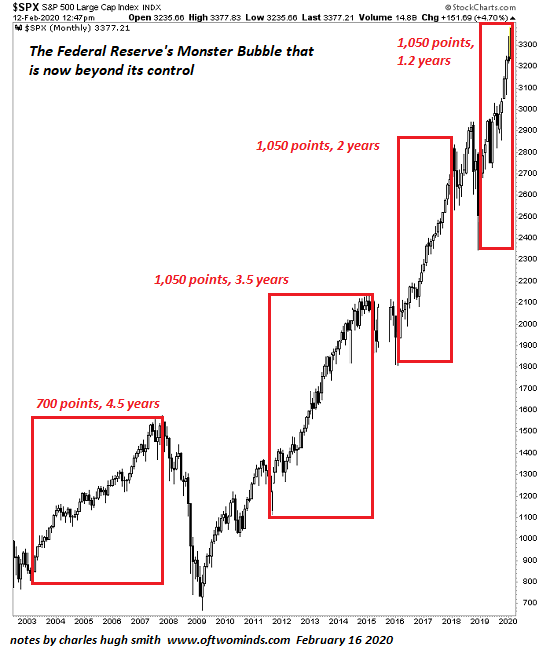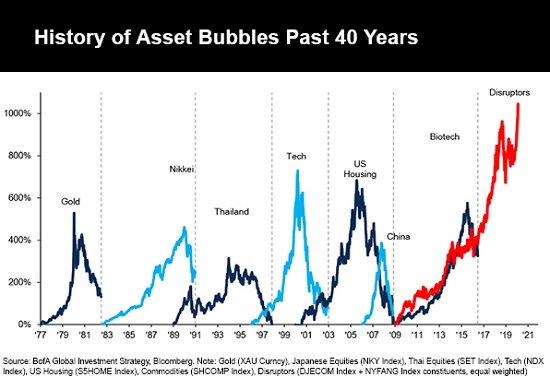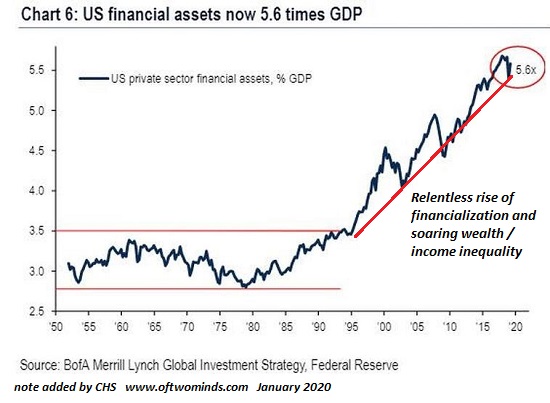By bailing out the sources of systemic fragility with trillions of dollars, the Fed has shifted the risk to the entire financial system and the nation's currency.
That the global economy is fragile is painfully obvious to all. What is less obvious is the bailouts intended to "save" the fragile economy actively increase its fragility, setting up an inevitable collapse of the entire precarious system.
Systems that are highly centralized, i.e. dependent on a handful of nodes that are each points of failure--are intrinsically fragile and prone to collapse. Put another way, systems in which all the critical nodes are tightly bound are prone to domino-like cascades of failure as any one point of failure quickly disrupts every other critical node that is bound to it.
Ours is an economy in which capital, wealth, power and control are concentrated in a few nodes of the network/ecosystem we call "the economy." A handful of corporations own the vast majority of the media, a handful of banks control most of the lending and capital, a handful of hospital chains, pharmaceutical companies and insurers control healthcare, and so on.
Control of digital technologies is even more concentrated, in virtual monopolies: Google for search and Youtube, etc. and Facebook / Instagram and Twitter for social media, Microsoft and Apple for operating systems and services derived from OS, and so on.
The vast majority of participants in the economy are tightly bound to these concentrated nodes of capital and power, and these top-down, hierarchical dependencies generate fragility.
When unexpectedly severe variability and volatility occur, the disruption of a few nodes brings down the entire system. Thus the disruption of the subprime mortgage subsystem--a relatively small part of the total mortgage market and a tiny slice of the global financial system--nearly brought down the entire global financial system in 2008 because the GFS is a tightly bound system of centralized concentrations of capital, power and control.
Currently, we're seeing the fragility of a meat production system that has concentrated ownership and production of meatpacking into a relatively few nodes on which the entire food supply chain is totally dependent.
And so what's the status quo "fix" when this intrinsically fragile system comes apart? Increase its fragility by bailing out the most tightly bound, dominant nodes. This is what the monopoly on creating currency, the Federal Reserve, is doing on a vast scale.
Rather than reducing the fragility of the system, the Federal Reserve is increasing the fragility, guaranteeing a collapse of not just the financial system but the currency as well.
"Some things benefit from shocks; they thrive and grow when exposed to volatility, randomness, disorder, and stressors and love adventure , risk, and uncertainty. Yet, in spite of the ubiquity of the phenomenon, there is no word for the exact opposite of fragile. Let us call it antifragile. Antifragility is beyond resilience or robustness. The resilient resists shocks and stays the same; the antifragile gets better. This property is behind everything that has changed with time: evolution, culture, ideas, revolutions, political systems, technological innovation, cultural and economic success, corporate survival, good recipes, the rise of cities, cultures, legal systems, equatorial forests, bacterial resistance...even our own existence as a species on this planet.
And we can almost always detect antifragility (and fragility) using a simple test of asymmetry: anything that has more upside than downside from random events (or certain shocks) is antifragile; the reverse is fragile.
We have been fragilizing the economy, our health, political life, education, almost everything... by suppressing randomness and volatility. Much of our modern, structured, world has been harming us with top-down policies and contraptions (dubbed 'Soviet-Harvard delusions' in the book) which do precisely this: an insult to the antifragility of systems. This is the tragedy of modernity: as with neurotically overprotective parents, those trying to help are often hurting us the most.
Given the unattainability of perfect robustness, we need a mechanism by which the system regenerates itself continuously by using, rather than suffering from, random events, unpredictable shocks, stressors, and volatility."
Does our financial system advance via unexpected shocks, extreme volatility, unknown unknowns and ceaseless variability? You're joking, right? The smallest perturbation in any node brings the system to the edge of collapse. Exhibit #1 is last Fall's spot of bother in the obscure financial node known as the repo market. This relatively modest part of the financial system almost triggered a stock market crash, and so the monopoly on creating currency, the Fed, immediately printed hundreds of billions of dollars to bail out every single player in the repo market--all behind the scenes, of course, lest the extreme fragility of the entire over-leveraged, speculative contraption become visible.
Making an incredibly fragile system more fragile via bailing out every node of concentrated capital, power and control guarantees the entire rotten structure will collapse. As I have often pointed out here, risk cannot be made to disappear, it can only be shifted. By bailing out the sources of systemic fragility with trillions of dollars, the Fed has shifted the risk to the entire financial system and the nation's currency.
Simply put: the only possible output of Fed bailouts is the complete collapse of the entire financial system, including the currency the Fed is creating with such abandon.
NOTE: Contributions/subscriptions are acknowledged in the order received. Your name and email remain confidential and will not be given to any other individual, company or agency.
Thank you, Robert H. ($5/month), for your marvelously generous pledge to this site -- I am greatly honored by your support and readership. | | Thank you, Alan P. ($50), for your splendidly generous contribution to this site -- I am greatly honored by your support and readership. |




